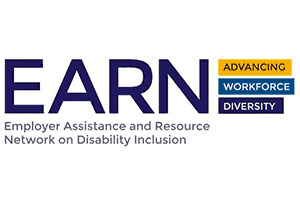The following blog post was authored by long-time DirectEmployers partner, Employer Assistance and Resource Network on Disability Inclusion (EARN).
There is little doubt that the COVID-19 pandemic has brought about many changes to the employment landscape, for both workers and employers. Statistics indicate that workers are leaving jobs, and sometimes entire industries, in record numbers. According to the Bureau of Labor Statistics, in March 2022, 4.5 million Americans quit their jobs, continuing a trend that has been seen throughout the last two years. “The Great Resignation,” as it has been coined, is impacting employers in many ways, including staff shortages, greater stress on current workers and decreased productivity.
While there has been a great deal of focus on the challenges, there are some silver linings that may increase opportunities for people to stay in the workforce, such as workplace flexibility and a renewed focus on worker mental health and wellbeing. As noted by Richard Sebastian, Jr., President and CEO of the Kennedy Center, Inc., a nonprofit disability service provider based in Connecticut, the Great Resignation could lead to the “Great Entrance,” allowing organizations to harness the talents and skills people with disabilities offer organizations of any size, in any industry. Thus, these dramatic workforce changes as a result of the pandemic offer an opportunity for employers to tap into an often-overlooked labor force – people with disabilities.
Historically, employees with disabilities are also more likely to remain in their job than employees without disabilities. However, this is also changing, as employees with disabilities – some of whom are at higher risk of contracting COVID-19 – are among those leaving the workforce. Some may resign due to lack of workplace accommodations or opportunities for advancement. As employers shift their focus to replacing employees who have left, the importance of strategies for retaining current employees should not be overlooked, including those with disabilities. Retaining employees with disabilities does not have to be difficult and can positively impact a company’s bottom line.
Four strategies that can help employers retain employees with disabilities include:
1. Know the Law
Federal and state governments have laws and regulations in place to prohibit discrimination against job applicants and employees with disabilities. For covered employers, these laws guarantee employees access to accommodations and other supports they may need to perform their best on the job (unless doing so would cause undue hardship). Employers should ensure that they are familiar with state and federal laws related to employment of people with disabilities, among them the Americans with Disabilities Act (ADA) and the Family and Medical Leave Act (FMLA), which allows employees to take up to 12 weeks of unpaid leave for certain family and medical reasons, including to manage their own serious health issues.
2. Provide Reasonable Accommodations
The need for reasonable accommodations varies from person to person based on the type of disability and the essential functions of their job. Some examples of reasonable accommodations include providing assistive technology devices or a flexible work schedule. It is essential to establish clear communication about accommodations, starting with the application process. Employers can support these efforts by providing information on their career websites about the process for requesting accommodations for applications or interviews. Employers should also work to establish an inclusive workplace culture that allows candidates and employees with disabilities to feel safe and supported when voluntary self-identifying. Doing so will make employees with disabilities feel more comfortable discussing their needs so that they are able to perform their job effectively. It is important to note that inviting employees to self-identify is only permissible when the question is being asked for affirmative action purposes.
3. Foster an Inclusive Culture
Employers should implement and support policies that promote a commitment to an inclusive workplace. To start, ensure that everyone in your organization, including leadership, is trained on how to respectfully communicate with and about employees with disabilities. Offering a disability etiquette training course can help ensure your organization is welcoming and inclusive of all employees, including those with disabilities. Another way to demonstrate a commitment to inclusion is providing resources and accommodations to employees who are experiencing mental health conditions, especially given the higher rates of anxiety and depression being reported as a result of the pandemic.
4. Measure Progress
Successfully retaining employees is a continuous process that requires careful planning and improvement. Employers should evaluate and measure progress by collecting data and feedback that clarify which strategies are working and which need to be revisited. Exit interviews can also help organizations gather feedback to learn what factors contribute to employee separations, and what practices and policies can support employee retention. In addition, your organization’s disability-focused employee resource group (ERG) can provide an opportunity to hear directly from employees with disabilities about the issues and concerns of importance to them.
To combat the Great Resignation, employers cannot solely focus on hiring. They must work to retain current workers, including those with disabilities. Implementing strategies to ensure your workplace is welcoming and inclusive of everyone supports retention of all employees, helping them feel valued, respected and productive at work.
About EARN
The Employer Assistance and Resource Network on Disability Inclusion (EARN) helps employers and HR professionals recruit, hire, retain and advance people with disabilities in the workplace. It offers easy access to resources, including workplace training and educational materials, to assist employers in building a disability-inclusive environment and meeting their workplace diversity, equity, inclusion and accessibility (DEIA) goals. The Mental Health Toolkit and Inclusion@Work Framework, along with a suite of new online courses, easy-to-use checklists and in-depth policy guides, are all housed in one place to help organizations. In addition, visitors will find information on trending topics such as COVID-19 and the ADA, accessible telework, inclusive retention strategies and workplace neurodiversity.

